info@dentallifeline.com
 20 Oct 2023
20 Oct 2023
MILK TEETH: WHY THEY ARE CRUCIAL FOR ORAL HEALTH
The most frequently asked question by most of the parents to a dentist is, “What is the importance of baby teeth?” and, “Why to save or take care of milk teeth when ultimately, they are going to fall and get replaced by permanent teeth?”
– The answer to this is, baby teeth are just as important as the permanent teeth and require proper oral care.
– Negligence towards the care of baby teeth can lead to serious problems affecting not only their dental health but also general health.

What are milk/baby teeth?
– Baby teeth or as dentist call them, “deciduous” or “primary” teeth, are actually present in the jaws when they are born, though they don’t usually appear until the baby is between 5 and 12 months old.
– Over the next three year, a full set of 20 primary teeth come, helping your child chew, supporting speech development, and giving them their cute smile.

IMPORTANCE OF MILK TEETH:
1. Mastication[chewing]
Children need their teeth to chew food. So, if their teeth are permitted to decay, the child will not only suffer from discomfort, pain, and abscessed (pus formation) tooth, but also be unable to eat. This, in turn, could lead to malnourishment, ultimately affecting their growth.
2. Smile
Children need their teeth to smile. The stigma of blackened teeth and bad breath can lead to serious teasing at school and at play, which could affect the child’s psychosocial development.
3. Facial Development
Milk teeth are needed a for normal growth of the jaw bone and give an appropriate shape to the face. Primary teeth control the development of the jaw muscles and the jaw bones so that they are properly developed and can provide suitable space for the permanent set of teeth. Milk teeth give the face its shape and form.
4. Prevention of Abnormal Growth
Space saver milk teeth are essential to hold the spaces open so that the permanent teeth can come into the correct position when they are finally developed enough to erupt (erupt-to come through the gums). mispositioning of teeth can lead to crooked teeth, chewing difficulties, facial asymmetries, TMJ problems, and last but most important, decaying of teeth.
5. Speech
Milk teeth help in the development of speech. The tongue produces certain sounds with the presence of (primary) teeth. Children have difficulty in learning to pronounce the sounds like “th” and “f” in the absence of their front teeth.
6. Psychosocial Well-being
Milk teeth are important to maintain child’s psychosocial well-being as well. Healthy baby teeth are a tremendous boost to a child’s self-confidence and self-esteem.

WHY MILK TEETH SHED OFF?
– A child’s baby teeth typically begin to loosen and fall out to make room for permanent teeth at about age 6.
– However, sometimes this can be delayed by as much as a year.
– The first baby teeth to fall out are typically the two bottom front teeth and the two top front teeth.

Oral hygiene is important for kids too…
It’s important to start practicing good oral hygiene as soon as your child’s first baby tooth erupts. For example;
• Remind your child to brush his or teeth at least twice a day. Supervise and offer assistance as needed.
• Help your child clean between his or her teeth daily.
• Eat a healthy diet and limit sugary food and beverages.
• Schedule regular dental visits for your child. Regular brushing at home is important, but it is not enough to keep teeth and gums healthy.
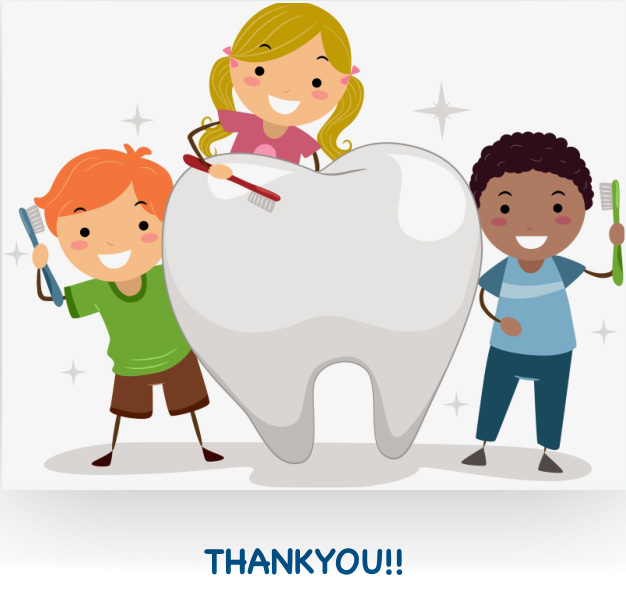
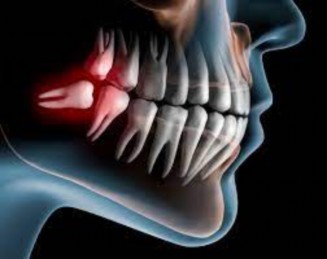 05 Oct 2023
05 Oct 2023
WISDOM TOOTH / IMPACTED TOOTH REMOVAL
Removal of wisdom teeth is a typical dental procedure. Wisdom teeth are the third molars located in the back of the mouth where it can be difficult to clean. In some cases, the wisdom teeth can crowd and then impact teeth nearby. That’s why many opt to remove them with the help from their dentist.
WHY DO YOU NEED TO REMOVE WISDOM TOOTH?
A wisdom tooth may get stuck or develop at an angle if there is not enough space to come through usually, we call this an impacted wisdom tooth.
If left untreated, this can affect your overall oral health.
If a wisdom tooth doesn’t come in properly or there isn’t enough room in your mouth, it can cause complications.
Impacted wisdom teeth can cause infection, pain, inflammation and other issues.
Dentists may recommend the removal of wisdom teeth as a precaution because they can cause long-term problems, like:
- Developing tooth decay or gum disease
- If wisdom teeth are impacted, you may develop and infection around the gum
- It may harm nearby teeth
- The impacted tooth may have a build-up of bacteria and plaque around it
- In rare cases, before the tooth erupts, there’s a possibility that the sack of tissue around the tooth can grow into a cyst.

WHEN DO YOU NEED WISDOM TOOTH REMOVAL ?
For many, their wisdom teeth grow normally and they won’t cause any problems. So some people choose to keep their wisdom teeth.
For others, it’s worth considering wisdom tooth extractions as their development can eventually lead to serious dental problems depending on your dental history. Most people have their wisdom teeth removed because they are crowding or damaging other teeth in the mouth. Impacted wisdom teeth may also cause pain, gum disease, and infection.
- Infection or cavities
- Lesions
- Damage to nearby teeth
- Jaw Damage
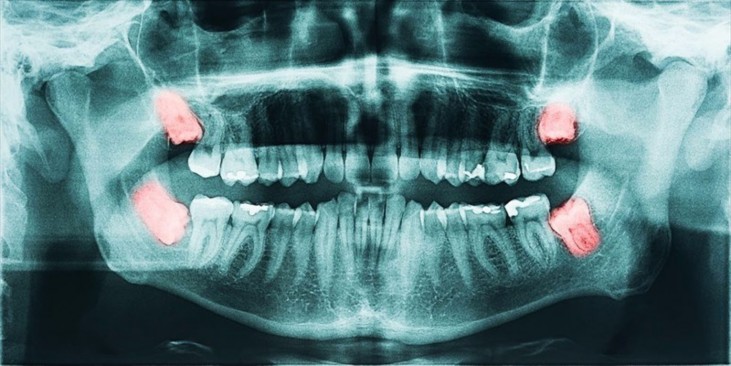
How long does it take to recover?
Recovery time can vary patient to patient, with most people recovering from wisdom tooth extraction within a few days to a few weeks. However, some people may experience more discomfort or take longer in their healing process after more difficult extractions. Recovery time can also vary depending on how many teeth and the type of extraction (simple or surgical). Always follow your dentists advice for aftercare, however listed below are things to promote healing after surgery.
Bleeding gums
Excessive bleeding may occur the first day after the removal. Try to refrain from excessive spitting so that you don’t dislodge the blood clots.

Pain management
A prescription from your oral surgeon or dentist. Holding a cold pack to the area may relieve pain and jaw stiffness.
Swelling and bruising Typically improves within two or three days. Your dentist or surgeon may instruct the use of an ice pack.
Activity
Rest on the surgery day and resume normal activities the next day. Avoid complex activities
Beverages
Dentists or oral surgeons suggest drinking a lot of water after the surgery and not with a straw because sucking may dislodge the blood clot. Don’t drink caffeinated, alcoholic, carbonated or hot beverages in the following 24 hours after surgery.
Food
Consume only soft foods in the 24 hours after surgery. Please refrain from eating chewy, hard, hot or spicy foods as they delay healing
Oral Hygiene
Typically, dentists will tell you to brush your teeth only after 24 hours from surgery. Don’t spit, brush your teeth, or rinse your mouth before. Use warm salt water every two hours for rinsing and after meals for a week.
Stitches
You may have stitches that dissolve within a few weeks or no stitches at all. Schedule an appointment to have them taken out if you have one.
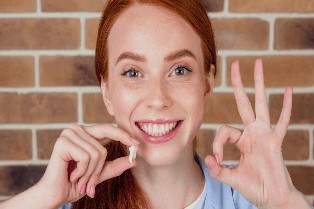
Thank You!
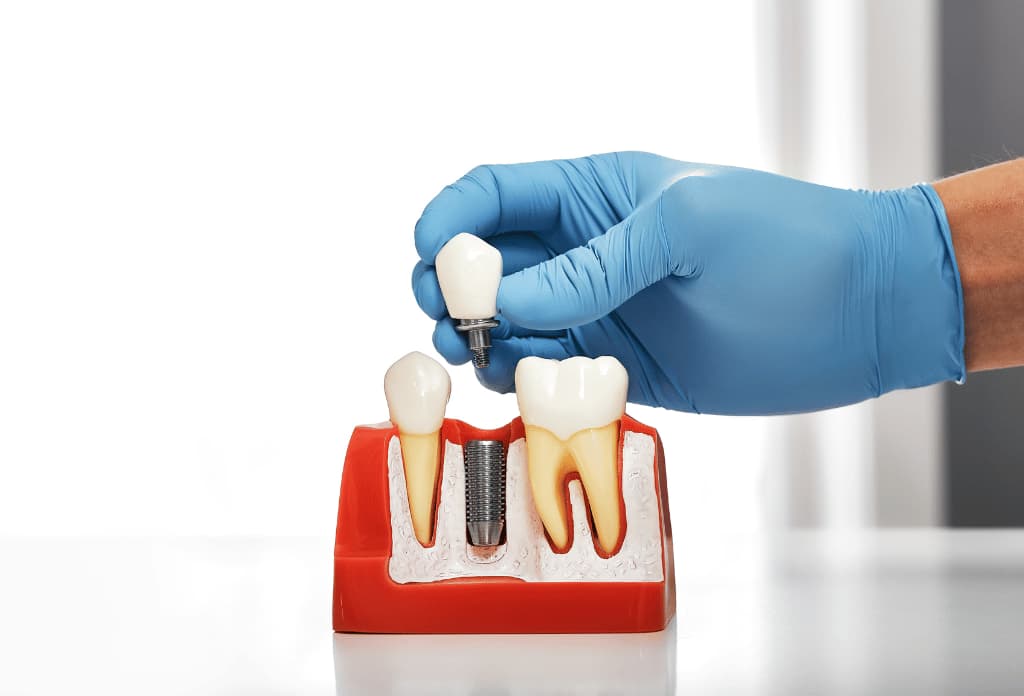 05 Oct 2023
05 Oct 2023
Exploring Different Types of Dental Implants: Which One Is Right for You?
Introduction
Dental implants have revolutionized the field of dentistry, offering a reliable and long-lasting solution for replacing missing teeth. If you’re considering dental implants, it’s essential to understand that there isn’t a one-size-fits-all approach. Various types of dental implants are available, each designed to meet specific needs. In this blog, we’ll explore the different types of dental implants and help you determine which one might be the right choice for you.
Chapter 1: Traditional Dental Implants
Traditional dental implants are the most commonly used type. In this chapter, we’ll discuss:
- How traditional dental implants are placed and their components.
- The ideal candidates for traditional implants.
- The benefits of stability, durability, and natural appearance they offer.
Chapter 2: Mini Dental Implants
Mini dental implants are a smaller version of traditional implants. We will explore:
- The advantages of mini dental implants, including a less invasive procedure.
- Situations where mini implants are particularly beneficial.
- The durability and versatility of mini implants for various dental restorations.
Chapter 3: All-on-4 and All-on-6 Implants
All-on-4 and All-on-6 implants are designed to support an entire arch of teeth with fewer implant posts. In this chapter, we’ll cover:
- How the All-on-4 and All-on-6 systems work.
- Candidates who may benefit from these options.
- The significant time and cost savings associated with these implant systems.
Chapter 4: Zygomatic Implants
Zygomatic implants are an alternative for individuals with severe bone loss in the upper jaw. We will discuss:
- How zygomatic implants are anchored in the cheekbones.
- The suitability of zygomatic implants for patients with insufficient bone density.
- The potential for same-day implant placement and restoration.
Chapter 5: Immediate Load or Same-Day Implants
Immediate load or same-day implants allow for the placement of dental restorations shortly after implant surgery. This chapter covers:
- The benefits of immediate load implants for expediting the treatment process.
- The conditions that make a patient a suitable candidate.
- How these implants contribute to a faster return to normal function and appearance.
Chapter 6: Choosing the Right Implant for You
In this chapter, we’ll provide guidance on selecting the most suitable implant type for your specific needs. We’ll discuss factors such as:
- Your oral health condition.
- Bone density and quality.
- Budget and insurance considerations.
- Cosmetic goals and preferences.
Conclusion
Dental implants offer a lifelike and long-lasting solution to missing teeth, but the choice of implant type should be tailored to your unique circumstances. Consulting with an experienced dentist or oral surgeon is essential to determine the most appropriate option for you. Regardless of the type of dental implant you choose, the result is likely to be a restored smile that enhances both your oral health and quality of life. Don’t hesitate to embark on this journey to regain your confident smile with the help of dental implants.
